La Chama and El Pana, the presenters created with artificial intelligence that use media in Venezuela to avoid the wave of arrests by the Maduro government
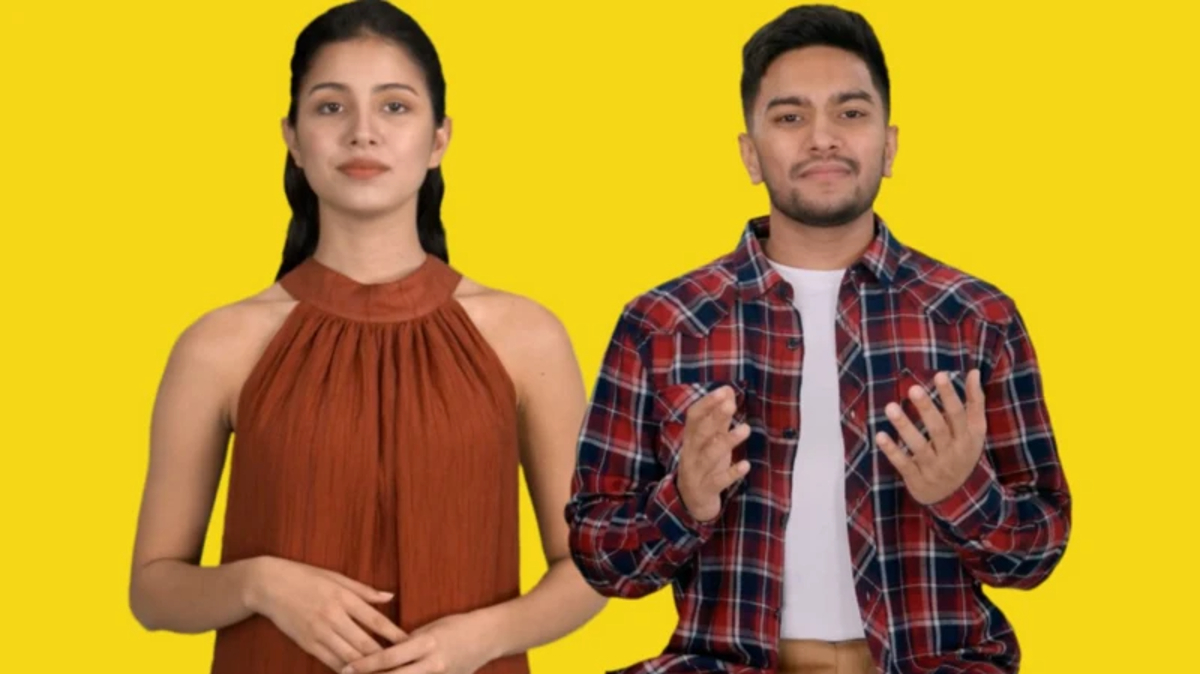
She introduces herself as La Chama. He is El Pana.
In a video they announce that they will report on what is happening in Venezuela after the elections in which the National Electoral Council (CNE) proclaimed President Nicolás Maduro the winner, without showing the voting records and despite the opposition’s allegations of fraud.
Before continuing, La Chama and El Pana make a clarification: “We want to tell you that we are not real. We were generated by artificial intelligence, but our content is real, verified, of quality and created by journalists.”
These avatars are the faces of Operation Retweetan initiative undertaken by a dozen Venezuelan media outlets to share content on social media without exposing editors and journalists the persecution of the Maduro government following the July 28 elections.
In order to report on the elections, these media outlets joined forces as Venezuela Vota and La Hora De Venezuela. However, they decided to change their coverage strategy two weeks after the vote, following the wave of arrests that occurred throughout the country as a result of the protests.
“Operation Retweet is an example of collective intelligence, which uses artificial intelligence to achieve the purpose of informing despite the siege that has been sought to be imposed in Venezuela,” said Carlos Eduardo Huertas, director of You connecta Colombia-based journalism organization that has served as the “articulator” of the initiative.
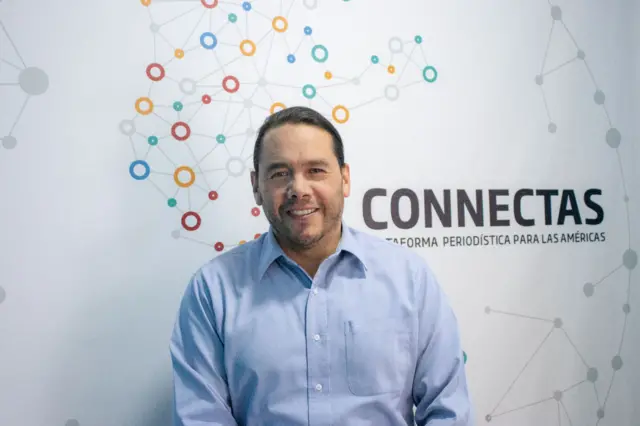
Connectas Carlos Eduardo Huertas heads Connectas, a Colombia-based journalism organization that has coordinated the initiative.
“It is an unprecedented exercise in collaborative journalism in the region.which is allowing us to provide verified, rigorous and quality information to more audiences,” explained Huertas, who insisted on giving credit to the Venezuelan journalists who chose to remain anonymous for fear of reprisals.
The opposition, led by Edmundo González and the leader María Corina Machado, enabled a digital platform in which 81.7% of the voting records were published. According to these records, Gonzalez obtained 67% of the votes while Maduro would have obtained 30%.
However, on election night the CNE reported that Maduro obtained 52% of the votes, beating Gonzalez by more than 1 million votes. The president decided to resort to an expert opinion from the Supreme Court of Justice (TSJ)close to the government, which validated its victory without showing the minutes.
A month after the vote, more than a dozen governments from the international community They demand that the CNE show the minutes and they do not recognize Maduro’s victory endorsed by the TSJ.
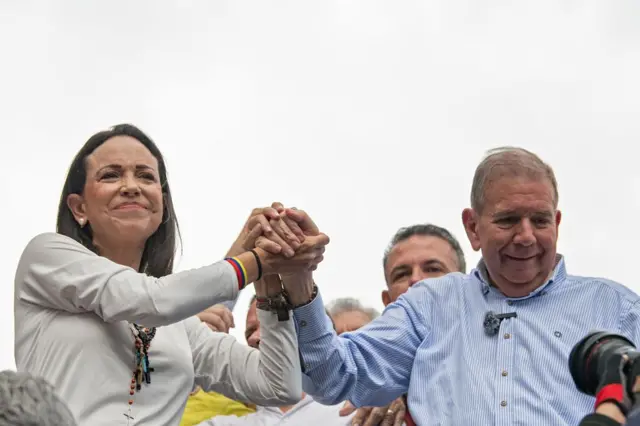
Getty Images María Corina Machado and Edmundo González denounce that the opposition won the elections of July 28.
The arrests
In the first of nine videos published so far by Operation Retuit, La Chama and El Pana report that There are more than 1,000 arrests and at least 23 deaths during the demonstrationsHowever, they clarify that it is not known exactly how many people have been arrested so far.
By mid-August, Maduro’s government claimed that there were 2,229 detainees, according to the reports. But the NGO Foro Penal counted 1,263 arrests, including political leaders, activists, journalists, ordinary citizens and more than a hundred minors, accused of crimes such as terrorism and inciting hatred.
“Why are the government figures bigger?” La Chama asked.Human rights defenders say it is a way to intimidate Venezuelans from continuing to protest.“, he replied.
Thirteen journalists were among those arrested, the National Union of Press Workers of Venezuela reported. The latest was Carmela Longo, a reporter specializing in entertainment who was arrested with her son when her home was raided without a warrant.
The union reported that Longo was released, but is subject to a court appearance regime, with a ban on leaving the country and from testifying or writing about her case.
After calling “terrorists“Maduro assured that those arrested were transferred to common prisons such as Stumpthe prison where the mega organized crime gang emerged Aragua Trainwhich was dismantled by authorities in September last year.
By the end of August, a month after the elections, the Venezuelan Attorney General’s Office reported more than 2,400 arrests, while Foro Penal reported 1,674 detainees.
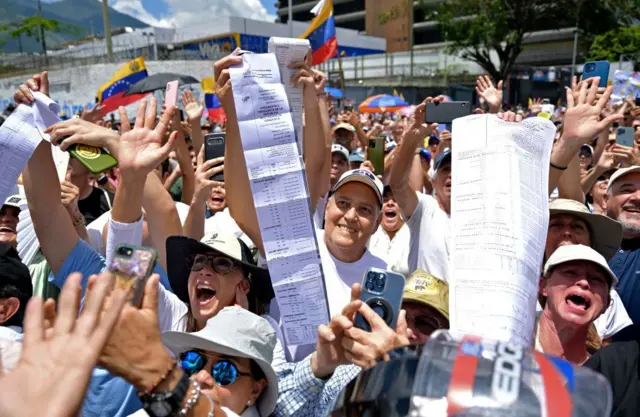
AFP Opposition voters demand that the CNE show the voting records.
“As things continued to happen, we realised that we had to do more and fine-tune the mechanisms to protect the identity of journalists,” an editor involved in Operation Retweet told BBC Mundo, asking to remain anonymous.
“The challenge was to continue to inform and tell our audiences that they can trust us.”
The Special Rapporteur for Freedom of Expression of the Inter-American Commission on Human Rights condemned the “arbitrary detentions of journalists and the systematic persecution of dissident media and voices in Venezuela during the post-electoral period.”
La Chama and El Pana remember in another video that after the elections, Maduro ordered to block social network X for 10 daysclaiming that there was “a cyber coup against Venezuela,” in which the South African magnate Elon Musk, owner of this platform, would be involved.
As if he were a government, the president said he broke relations with WhatsApp and called on Venezuelans to uninstall the application.
The media reported that in the popular sectors where there were protests, and which traditionally voted for Chavismo, the police detained citizens to prove their militancy in favor of the opposition through the content published and shared on their social networks.
“Venezuela has significant evidence of a deterioration of its democracy for many years,” said Carlos Eduardo Huertas, recalling that Most of the media that make up Operation Retweet have been or are blocked within Venezuela.
How Operation Retweet came about
The director of Connectas indicated that the name of the initiative responds to two purposes. The first word is a challenge to the Operation Tun Tunthe name that the Maduro government gave to the operations to arrest dissidents in Venezuela.
“The word ‘operation’ has become a term that frightens, misinforms and silences. In this case, we want to express that we are strategic. This is an operation to inform“Huertas explained.
Secondly, “the word ‘retweet’, in the slang of young Venezuelans, means: ‘I validate and I share’.” For this reason, they call on users to share content as “a dissemination strategy, which does not have a centralized channel but rather seeks the largest number of channels possible.”
The hundred journalists who participate in this initiative agreed to stop signing the notes they write and not appear in videos on social networks.
The media involved are free to republish the videos of La Chama and El Pana, which are available on the Connectas social networks and website.
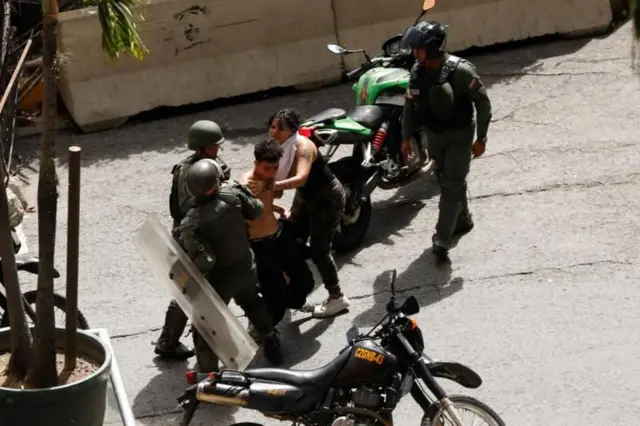
Getty Images More than 1,000 people have been detained in Venezuela following the elections.
The decision on what the presenters would look like was an exercise in voting and consensus.
“Following the old Venezuelan tradition of holding pageants and contests, (the avatars) were subjected to an intense competition to identify the most suitable casting,” Huertas said.
They decided that she would have tanned skin, long hair and wear a brown off-the-shoulder dress. He would have a beard and short hair and wear a plaid shirt. They both speak with a Venezuelan accent and appear to be in their twenties.
The journalists involved consider that Operation Retweet is having a success.
“On the one hand, we are reaching more people. In addition to being an eye-catching format, it has achieved an international impact that makes visible what is happening with journalists in Venezuela,” a journalist told BBC Mundo. “I think it has given us some protection”.
The initiative sparked solidarity among Venezuelan journalists abroad, who are now republishing content produced by their colleagues on their social networks, with artificial intelligence avatars.
Independent journalism needs the support of its readers to continue and ensure that uncomfortable news that they don’t want you to read remains within your reach. Today, with your support, we will continue working hard for censorship-free journalism!
